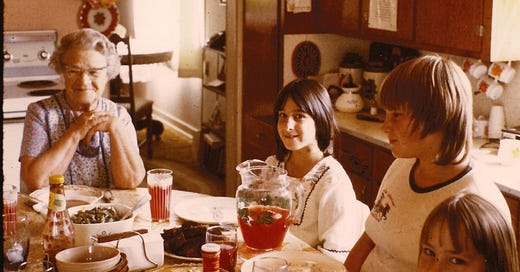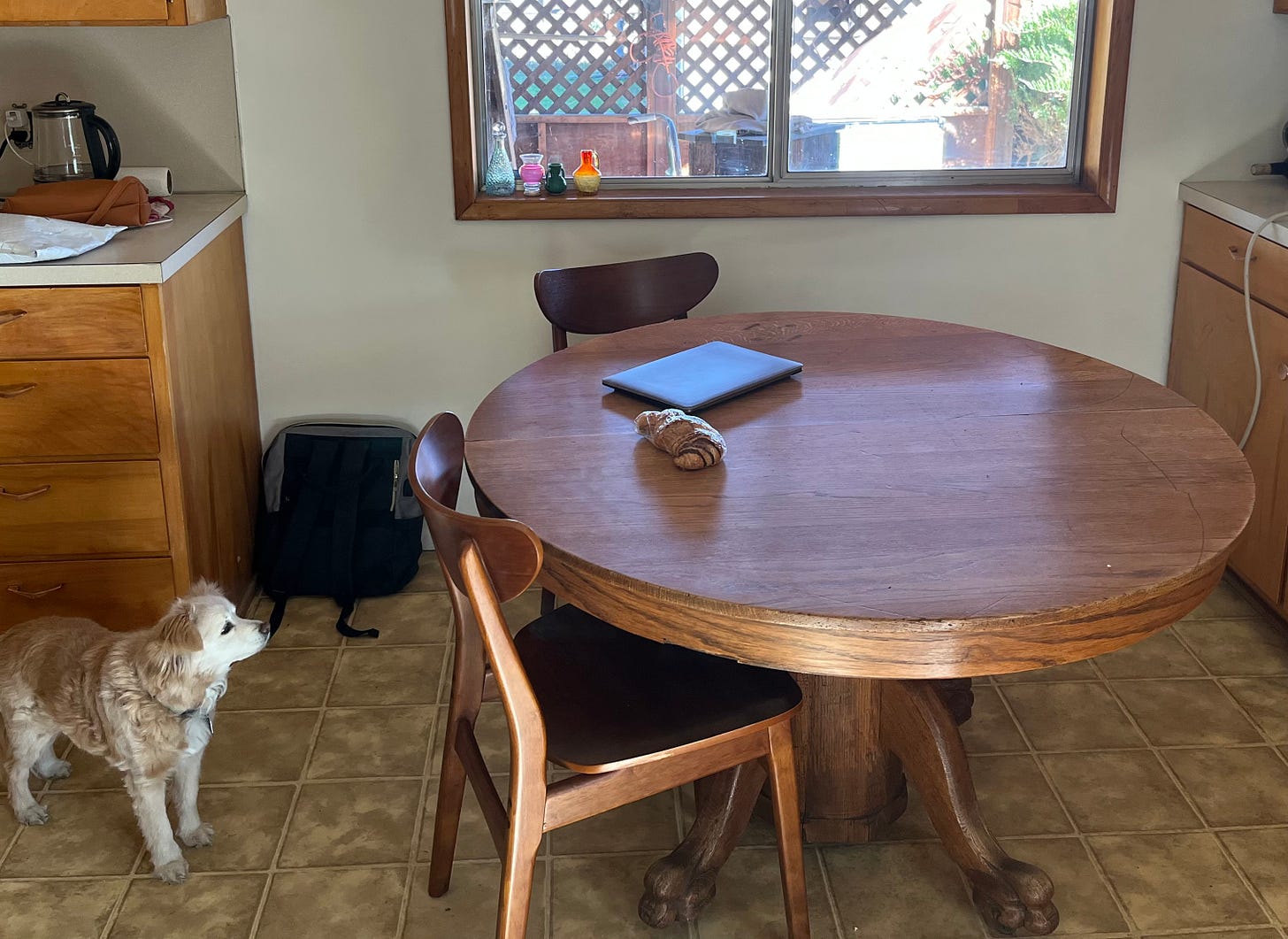At the end of July, I traveled to see a friend who was not doing well. For four days I sat by his bed and read to him from When the Light of the World Was Subdued, Our Songs Came Through: A Norton Anthology of Native Nations Poetry, edited by Joy Harjo. By the time I left, my friend was doing better. Was it my presence or the poetry? Perhaps a little of both.
I was fortunate to see Joy Harjo perform her poetry with her saxophone and a backup band in Tulsa in 2023. During a break when we found ourselves face to face, I stumbled. Without thinking, I blurted, “I’m awestruck” which, trust me, is not at all like me. Her eyes rolled and as her head began to follow, I salvaged the moment (barely) by saying Joel Daniel Phillips was a good friend. And then she smiled. (Joel’s portrait of Joy is in the permanent collection of the Smithsonian National Portrait Gallery, see it here: Joy Harjo portrait).
But that was Tulsa, the town where she lives as part of the Muscogee Creek Nation. I certainly never expected to see her in Idaho. Yet two weeks ago that’s where she was: in Ketchum receiving an honor from The Community Library.
Again I stumble with words. She is so lovely and subtle and profound. And, at one point she mentioned the kitchen table and I suddenly knew to turn on my phone and record her. I was embarrassed by this, so the video jumps a bit until 0:21 but then it stays steady. Here is 2 minutes of Joy Harjo, 23rd Poet Laureate of the United States, reading “Perhaps the World Ends Here.”
The Kitchen Table. So much happens around a kitchen table. Or a dining table, especially if it happens to be in the kitchen. ;)
My Grama Baird had a kitchen table which was the center of all activity. Noontime dinner with six to ten kids that included plenty of passing bowls of food and being scolded for reaching. This is where she deboned bluegills and sunfish and glazed her cinnamon rolls. Where she ate her watermelon with salt and a fork and drank tea out of china cups while the rest of us ate wafer cookies. This is where folks sat for hours catching up during a visit and also where we played endless games of Rummy.
The first thing I purchased for myself when I moved to Idaho was an antique round pedestal oak table that extended to an oval. Every Easter, I spread it open and friends gathered for a large meal and hours of laughter. It was my favorite day of the year.
I sold that table when I sold my Idaho home. Much to my amazement, Tom kept it. Last Autumn when we moved into this old house, when we had no floors and walls still needed fresh paint, when we had months of renovation ahead of us, Tom hauled my old oak table into our kitchen.
Some of the best moments of my life—and my very favorite memories—happened around dining tables. I wrote about this over three years ago. The following is just a bit of that post:
The Table Where We Live
My sister told me the other day that she wanted to sell her dining room table but no one will buy it. I was aghast. Firstly, that she no longer wanted it and, secondly, that no one else did either.
Then, to support her claim, she sent me this article by Melinda Fakuade: What is the dining table really for? Apparently, dining rooms are a thing of the past.
This makes me sad. It’s not the demise of the dining room that bothers me. Any room that isn’t used regularly is a waste of space and drains us energetically. It’s the living in that makes our houses homes.
Ah, but the dining table -- that is different. Dining tables are more than surfaces for eating. They are vessels for living.
As silent housemates, they ask for nothing, and exist only to serve. Here, let me hold your plate and your coffee. Sit beside me and talk. Play a game. Work. Strategize. Put your head on me and cry. Bang your fist. Make plans. Write. Solve problems. Create. Deal cards. Visit. Spill your wine? I’ll catch it. Beside me, you will be nourished. Come, fold your hands over me. Eat.
Dining tables hold us together as families. They support all our activities – essential, important, creative, even trivial. And, by extension, they support our souls.
Dining tables are a symbol of possibility, of community, and a way of living that is deeply nourishing. Whether in a kitchen, on a porch, or in their own special room, dining tables do more than double duty in the myriad of ways we use them. For work, for crafts, for playing, and for eating. Even when we are alone, these tables bring us together.
Take away the dining room but keep a table for dining. Use it any way you need. Underneath the clutter, these tables are a reservoir of memories, support, nourishment, and possibility.
My home would be empty without my big oak table. Like a bedroom without a bed. As much as I use other rooms—the office to write, the living room to relax—life happens around this table.
What about you? Do you have a table that is an axis mundi of sorts? An anchor in your home around which so much happens?
And here’s Joy’s poem, in case you prefer to read than watch and listen:
Perhaps the World Ends Here by Joy Harjo
The world begins at a kitchen table. No matter what, we must eat to live.
The gifts of earth are brought and prepared, set on the table. So it has been since creation, and it will go on.
We chase chickens or dogs away from it. Babies teethe at the corners. They scrape their knees under it.
It is here that children are given instructions on what it means to be human. We make men at it, we make women.
At this table we gossip, recall enemies and the ghosts of lovers.
Our dreams drink coffee with us as they put their arms around our children. They laugh with us at our poor falling-down selves and as we put ourselves back together once again at the table.
This table has been a house in the rain, an umbrella in the sun.
Wars have begun and ended at this table. It is a place to hide in the shadow of terror. A place to celebrate the terrible victory.
We have given birth on this table, and have prepared our parents for burial here.
At this table we sing with joy, with sorrow. We pray of suffering and remorse. We give thanks.
Perhaps the world will end at the kitchen table, while we are laughing and crying, eating of the last sweet bite.
"Perhaps the World Ends Here" from The Woman Who Fell From the Sky by Joy Harjo. Copyright © 1994 by Joy Harjo.






I have a round oak table and that’s the kitchen table that Laura Paul and I sat around during her 14 3/4 years of life. We still have that table though our kitchen now has one of those modern marble counters we bought the house that way, I’m not really a fan of the modern kitchen. I kept that oak table. It will always be in our life and I keep it in a quarter and I put my record player on it and I have a vase of sunflowers on it and it’s a special table that will stay with me forever. Thanks for reminding me about the value of the kitchen table and I had a lot of good memories around my kitchen table growing up as well. I’m so glad that Tom kept that table.
We have a round, oak, pedestal table that looks a lot like yours, except ours was made in Croatia, for whatever sense that makes, but probably in the context of our family life, makes a lot of sense.
Thanks, neighbor. That was a good one. I’ve been thinking about making a trip over the hill to throw a few pennies on Papa’s grave, but mostly to visit the grave of a wonderful old friend who drew cartoons for the Mountain Express, Norman Algiers. I’ll let you know when and maybe we can meet up.